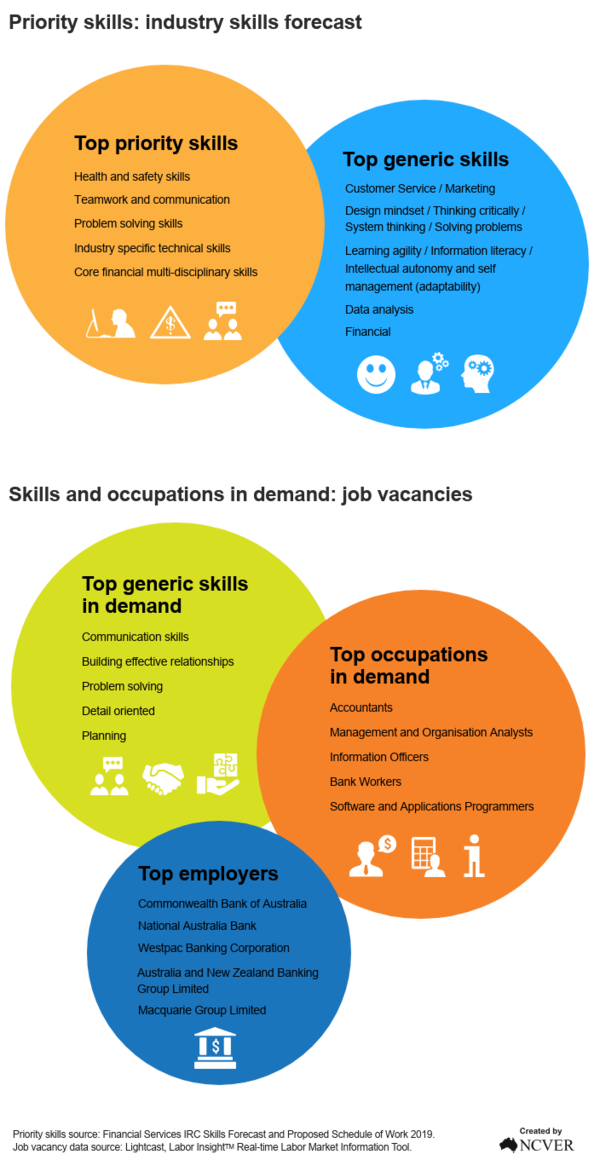
Industry insights on skills needs
The Financial Services IRC’s 2019 Skills Forecast suggests the top priority skills for the Financial Services industry include health and safety skills, teamwork and communication, and problem solving skills. These are in addition to sector specific technical and multi-disciplinary skills. The top three generic skills focus primarily on soft skills including customer service, critical thinking, and learning agility. Data analysis is rated as the fourth most important generic skill for the sector.
According to the job vacancy data, the top generic skills requested by employers in the Financial Services industry were communication skills and building effective relationships. The most advertised occupations were Accountants followed by Management and Organisation Analysts. The top employers were the big four banks and Macquarie Group.
The above Skills Forecast highlights some of the key drivers of change for the Financial Services industry. These include demographic change, increased focus on ethical service and risk management, the impact of the Royal Commission into Misconduct in the Banking, Superannuation and Financial Services Industry, and technological change.
The ageing population will drive strong demand for health insurance, superannuation and financial advice over the medium to long term. Health and life insurance are likely to see the most growth off the back of the ageing population, with industry revenue projected to grow by 21% and 19% respectively over the next five years. Demographic changes will shape the insurance sector by increasing demand for health insurance, which will require a growing number of health insurance workers across the board, specialising in services for over 65s. Heavy reliance on the National Disability Insurance Scheme (NDIS) will require a multitude of workers and skills, such as insurance assessors, particularly with the ageing population driving demand (half of over 65s have a disability). The NDIS therefore presents a significant growth opportunity for training in this sector, requiring more insurance assessors specialising in assessments for people with disability.
Demographic changes will shape the superannuation sector by increasing the proportion of superannuation assets held in the retirement phase. Understanding the needs of a client in retirement and communicating risks will be vitally important to financial advisers in the sector. Demographic changes will drive demand for self-managed superannuation funds (SMSFs). As the SMSF trend continues, financial services workers will play more of an advisory and transactional role in assisting SMSF members to manage their own funds, rather than managing the funds on the member's behalf.
Financial planning and advice is expected to grow through increased demand from older Australians seeking financial advice in their retirement. Demographic changes will shape the financial planning and advice sector by increasing demand for financial advice from superannuates, as growing post-retirement wealth creates a greater incentive to seek professional financial advice. The ability to assist clients through the potential emotional and psychological stress of retirement will be crucial. Strong demand for property is driving demand for mortgage brokers and general insurers, in addition to financial advisers.
Demographic changes will shape the trust administration sector through increasing focus on products required for the management of the financial affairs for ageing Australians who may no longer be able to make financial decisions for themselves, such as powers of attorney and financial administration orders.
Ultimately, an ageing population will lead to an increased demand for most professionals in the many Financial Services sectors. Workers with specialist knowledge to support retirees accessing services in these sectors, and people with a disability under the NDIS scheme will be highly sought after. Workers in the sector will need strong customer service skills and risk management skills to ensure that retirees have a stable income stream and are able to effectively manage their wealth.
A focus on ethical service and risk management is increasing across the Financial Services industry, driven by changes in the regulatory environment, professional standards and public scrutiny. This is likely to increase employers' demand for skills such as compliance and risk management, with workers needing to have a strong understanding of regulations and ethical standards and have up to date knowledge regarding changes in the industry.
The above Skills Forecast also highlights the impact of increased regulation on the future of financial advice. New legislation has introduced higher minimum education requirements for new advisers effective 1 January 2019, and existing advisers effective 1 January 2026. These changes are expected to have a large impact on the financial planning sub-sector in the short to medium term.
As with many industries across the economy, emerging technologies are significant in shaping the future of the Financial Services industry. These technologies are often grouped together under the all-encompassing term of FinTech. These innovations are changing the services provided by the industry, as well as leading to the automation of many process-oriented roles in the industry and enabling more financial services in the gig and shared economies. Many technological advancements in the Financial Services industry are aimed at giving the consumer more knowledge and control of transactions and services, and the ability to conduct services for themselves, for example, internet and mobile banking allowing customers to manage their funds without going to a branch.
New technologies will require workers in specific sectors to be adaptable to change and learn the skills for new tools. These technologies all enable more data to be collected, leading to increased risks around managing and storing that data correctly and leading to a greater need for risk management skills and an understanding of regulatory controls around data protection and data management.
Alongside opportunities offered by new technologies, FinTech innovations are also likely to automate some tasks and roles currently undertaken by FNS graduates. For example, research has indicated that some administration roles within financial services and insurance have a high probability of being automated within this decade. While automation may lead to the complete replacement of some roles, requiring workers to move to higher skilled positions or exit the industry, it will also provide an opportunity for many workers to use different skills in related roles. In the Financial Services industry, changes to insurance or personal injury administration roles are leading workers to move away from processing claims to a more service oriented role focused on improving the customer's engagement with the company.
Therefore, flexibility and resilience skills will continue to be extremely important for graduates and workers adapting to technological change. Communication and other skills where humans generally have a competitive advantage over machines will be of particular importance, as these skills will help people transition between industries and roles within industries. Additionally, proficiency in computing skills, strong analytical skills, and adaptability to understand and embrace new technologies and work environments will enable workers to better prepare themselves for changing industry demands, particularly in the FinTech space with the increasing digitisation of products, platforms, and services.
According to the Oxford Economics report Technology and the Future of Australian Jobs: What Will be the Impact of AI on Workers in Every Sector?, Financial Services companies are placing greater emphasis on improving employee engagement and customer service, and will invest more in automation, analytics and customer interaction technology to empower employees accordingly. For many occupations in this industry, the need for non-routine, interpersonal and cognitive tasks such as interpreting information for others and providing advice are valuable, and more difficult to automate. That means they are relatively well protected from the implications of the next decade's technological change. An exception to that rule, amongst the sector's major occupations, is for Office Clerks. This role is typically focused on routine processing of information and analysis of data, tasks that technology is increasingly capable of performing. Oxford Economics predicts a 5% drop in headcount for this position. On the contrary, demand for Finance Managers and Bank Tellers (or an evolved variant of that customer-facing role) are predicted to grow by more than 10%, as the importance of interpersonal tasks, such as customer orientation and conflict resolution, and cognitive tasks, such as interpreting information for others, at which workers in these roles excel, grow in a more technology driven environment.
Oxford Economics anticipates that an expanding Financial Services industry will draw talent from other parts of the labour market but filling the new roles will require a degree of skills training. Their analysis suggests the most common skills challenge is critical thinking. Training also needs to be prioritised in skills such as active listening and decision making.
The KPMG report 30 Voices On 2030: The New Reality for Financial Services, argues that the arms race to secure the best talent and their desirable sets of skills will continue to be fierce for the rest of this decade. As technology and innovation continue to disrupt the industry, the war for talent – particularly for skills that are limited – is accelerating. Organisations depend on their talent to find growth in a protracted low-growth environment, to consciously consider the needs of the customer, to think creatively about the delivery of the customer experience and to construct partnerships that deliver those services. Consequently, a premium is now paid for emotionally intelligent employees with inquisitive, curious and perceptive mindsets. Organisational culture and leadership will be critical elements of the employee value proposition – particularly for attracting, developing and retaining talent. In an industry driven by artificial intelligence and data, traditional business and financial acumen is augmented with digital skills sets and the ability to be data dextrous. This is a key criterion of employment. Recruits are not required to understand specific coding languages, but they are required to understand the logic and algorithms that underpin and impact customer outcomes. Any Financial Services roles which require empathy, customer understanding, cultural nuances and soft skills will be safe, rewarded, and remain onshore.
The Modern Slavery Act 2018 (Cth) requires entities with a consolidated revenue of AU$100 million or more to submit an annual modern slavery statement on what they are doing to identify and manage modern slavery risk in their operations and supply chains. In the Financial Services industry context, this includes identifying and addressing risks of modern slavery across a wide range of business relationships. KPMG Australia and the Australian Human Rights Commission have collaborated to produce Financial Services and Modern Slavery: Practical Responses for Managing Risk to People to: highlight particular modern slavery risks prevalent in the Financial Services industry, including in banking, insurance, investment and asset management; provide tips for the Financial Services industry on leading practice and a rights-based approach to managing modern slavery risk; and foster transparent modern slavery reporting for the benefit of business, government and the people at risk of harm.
For more detailed analysis of industry skills needs, see the Financial Services sector pages.


